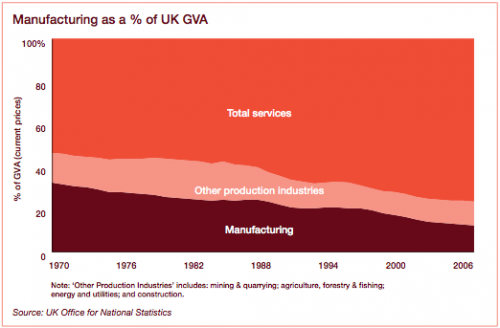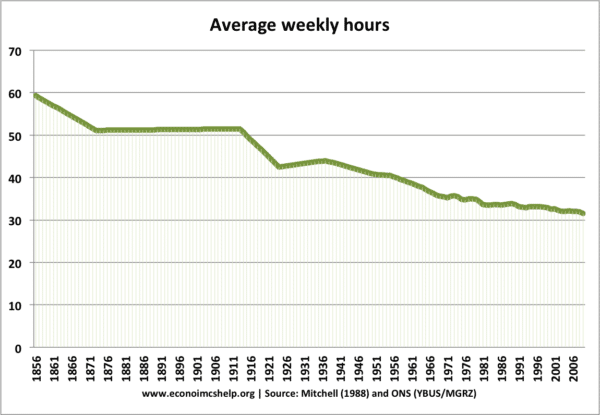Which Of The Following Is An Example Of Specializing In The Service Sector
Definition – The service sector is comprised of firms offering 'intangible goods' such every bit entertainment, retail, insurance, tourism and banking. The service sector volition make utilize of manufactured goods, only in that location is an additional component of offer a service to customers.

In a developed economic system similar the UK, the service sector is the biggest component of the economy, comprising nearly 80% of GDP and a similar ratio of employment. In the United states, the service sector comprises lxx% of the workforce.
In the UK, the main sectors of the service sector include:
- Retail industry
- Computer and I.T. services
- Hotels and tourism services
- Restaurants and Cafes
- Ship – rail, bus, air, body of water
- Advice
- Banking services
- Insurance services
- Pension services
- Food and drink services
- Postal services
See: Alphabetize of Services, ONS
Tertiarisation
In the past 100 years, adult economies have seen a transition from a manufacturing-based economy to one where the 'service sector' or 'third sector' dominates. Tertiarisation involves the service sector coming to incorporate the biggest chemical element of the economy.

A growing service sector is usually a sign of increased living standards – it enables consumers to relish more than leisure based service activities, such as tourism, sport and restaurants.
Reasons for growth of the tertiary sector
1. Improved labour productivity. A key factor behind tertiarisation is improved labour productivity. Better technology and improved labour productivity have enabled a higher output of manufactured goods and agronomics with less labour. This increased productivity has led to:
- Increased incomes of workers to spend on services.
- Spare labour to exist able to work in the more labour intensive third sector.
ii. Globalisation. Globalisation and free trade take enabled UK, US and developed economies to import more manufactured goods. Therefore, an increasing proportion of the economy can be devoted to college value service sector. Whilst the UK has lost comparative advantage in manufacturing goods, information technology compensates by specialising in service sector, such as finance and banking
3. Income elasticity of demand. As income increases, we spend a higher percentage on luxury service items – such as holidays, going out to restaurants. Manufactured goods are more income inelastic. As income rises, we spend a little more on household goods, just as we get rich, we can beget to pay someone to wash the automobile and get out for a meal rather than buy ingredients and melt ourselves.
4. Rising real incomes/ wages

5. More than leisure time

Rise real wages have enabled a fall in the average working week. In 1850, the average job took lx hours, leaving trivial time for leisure activities. (near people worked a 6-day calendar week). By 2009, this average working calendar week has fallen to 32 hours, leaving more hours for leisure activities.
6. Technology
New engineering has enabled new service sector industries to develop. Computers, telephones accept all been adult in the past 100 years. The growth of the internet has enabled a new range of tertiary services.
Concerns over Tertiarisation
There are some concerns over an economic system condign primarily based on the service sector.
- The volatility of finance. The UK relies on financial services for a large component of its Gdp. However, in the credit crunch of 2008/12 – the financial sector was left over-exposed to many losses and it required a authorities bailout. Iceland had an even more than extreme example with the banking sector becoming very large. (Iceland crisis). See also: over-financialisation of the economic system.
- Electric current account deficit. Another potential problem of the service sector is that oft it is harder to consign the service sector industries. A country with a large service sector may run a current account deficit – importing manufacturing goods and financing the deficit through attracting upper-case letter flows. This has often been the case for the UK. Even so, there is no guarantee that a growing service sector volition lead to a current account deficit. Increased globalisation has likewise enabled more services to exist traded, for example, cross-border I.T. support is much easier with the cyberspace.
- Increased inequality. The decline of manufacturing and ascent of service sector economy has led to uneven wage growth. Low skilled wages take tended to grow very slowly.
- Regional concentration of the economy. The service sector has seen a sharp rising in migration to big metropolitan cities. Service sector firms adopt to establish in big cities because of external economies of scale – in particular admission to skilled and mobile labour. This is causing growing populations in crowded cities – causing rising rents and 'gentrification' of former working class areas. In cities similar London, it is increasingly hard for fundamental public sector workers, like nurses and teachers to afford accomodation because of the price of living. On the other mitt, rural regional areas are increasingly left behind. Areas of rural America and the Rust Belt are not attracting the same kind of service sector investment. Therefore, when old industries similar farming and manufacturing turn down, the economy is not being revitalised in the aforementioned way.
Related
- Principal sector
- Manufacturing sector
- Sectors of the economy
- The knowledge economy
Which Of The Following Is An Example Of Specializing In The Service Sector,
Source: https://www.economicshelp.org/tertiary-service-sector/
Posted by: graygoodir80.blogspot.com


0 Response to "Which Of The Following Is An Example Of Specializing In The Service Sector"
Post a Comment